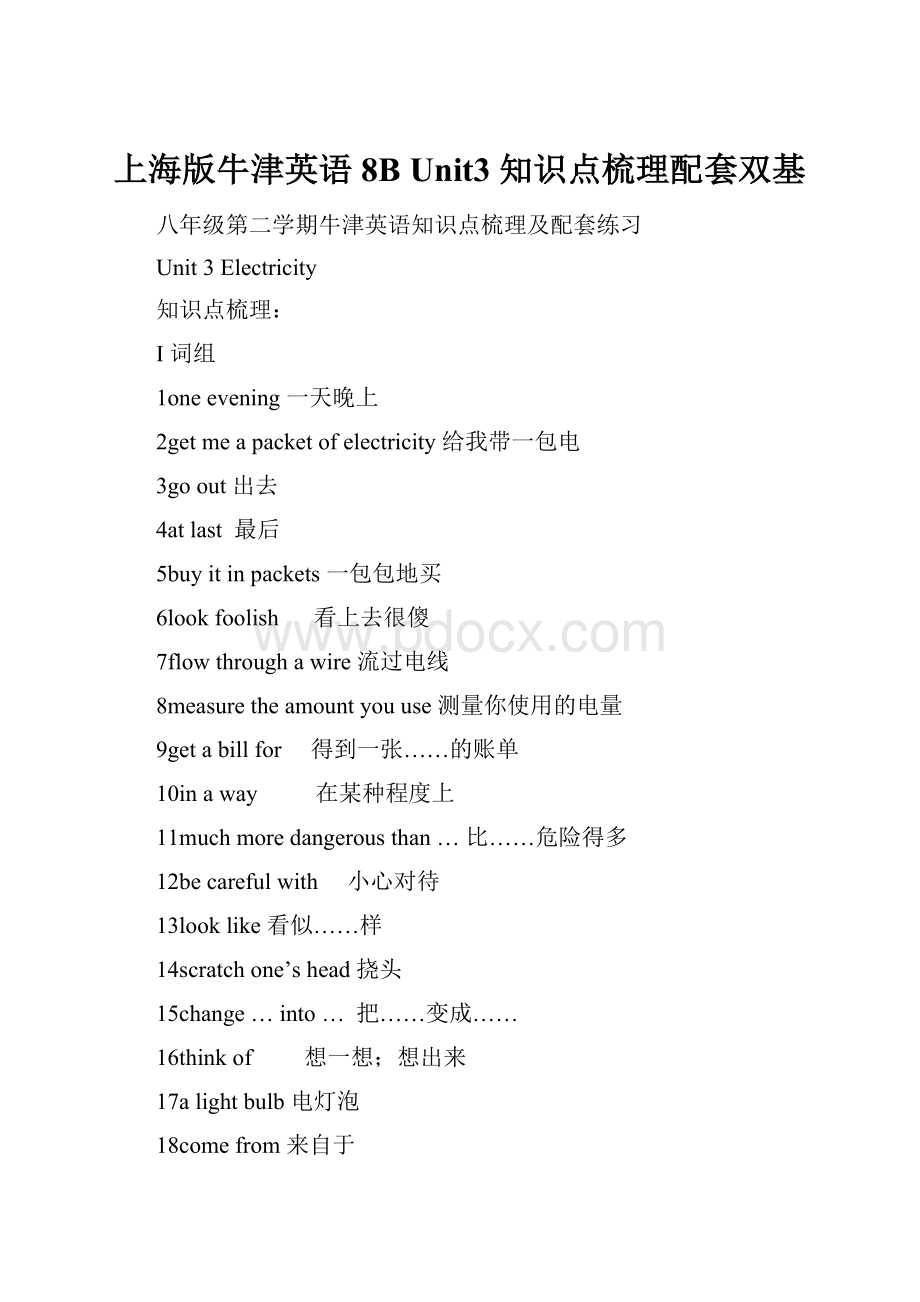上海版牛津英语8B Unit3 知识点梳理配套双基.docx
《上海版牛津英语8B Unit3 知识点梳理配套双基.docx》由会员分享,可在线阅读,更多相关《上海版牛津英语8B Unit3 知识点梳理配套双基.docx(17页珍藏版)》请在冰豆网上搜索。

上海版牛津英语8BUnit3知识点梳理配套双基
八年级第二学期牛津英语知识点梳理及配套练习
Unit3Electricity
知识点梳理:
I词组
1oneevening一天晚上
2getmeapacketofelectricity给我带一包电
3goout出去
4atlast最后
5buyitinpackets一包包地买
6lookfoolish看上去很傻
7flowthroughawire流过电线
8measuretheamountyouuse测量你使用的电量
9getabillfor得到一张……的账单
10inaway在某种程度上
11muchmoredangerousthan…比……危险得多
12becarefulwith小心对待
13looklike看似……样
14scratchone’shead挠头
15change…into…把……变成……
16thinkof想一想;想出来
17alightbulb电灯泡
18comefrom来自于
19differentformsofenergy各种能量
20beconnectedto被连接到……
21buryunderthestreet埋在路下
22apowerstation发电站
23comeback回来
24MayIhave…,please?
我可以……吗?
25onhisface在他脸上
26Hereitis.它在这儿
27Didn’tyouknowthat?
你不知道吗?
28switchoff关上
II.词性转换
1.dangerous(a.)危险的danger(n.)危险
2.servant(n.)仆人serve(v.)服务service(n.)服务
3.electricity(n.)电electric(a.)电的electrical(a.)有关电的
4.foolish(a.)愚蠢的fool(n.)傻瓜/(v.)愚弄
5.monthly(ad.)每月一次month(n.)月份
6.explanation(n.)解释explain(v.)解释
7.careful(a.)小心的care(n./v.)关心carefully(ad.)小心地
careless(a.)粗心的
8.invisible(a.)看不见的visible(a.)看得见的
9.change(n./v.)变化changeable(a.)多变的
10.different(a.)不同的difference(n.)不同点
11.power(n.)力powerful(a.)强大的
12.politely(ad.)有礼貌地polite(a.)有礼貌的impolite(a.)没礼貌的
13.contain(v.)包含container(n.)容器
14.clear(a.)清楚的clearly(ad.)清楚地
III.语言点
1.I’mgoingtobuyapacketofsweets.
apacketof意为“一包;一袋”。
句中的sweets作名词,意为“糖果”;sweet也可作形容词,意为“甜的”。
2.I’vetrickedDaisyatlast.
句中的trick作动词,意为“戏弄”;trick也可作名词,意为“诡计;花招;骗局”。
如:
playatrickonsb.。
atlast意为“最终”,与intheend和finally意思相同。
3.Shedoesn’tevenknowwhatelectricityis.
even在此作副词,表示“甚至;连;即使”,用来强调出乎意料。
even还可以用于比较级前,表示“甚至更;愈加;还”。
如:
evenhappier。
4.She’llreallylookfoolish.
句中的look为系动词,意为“显得”,后接形容词foolish作表语,说明主语的状态。
5.Ametermeasurestheamountyouuse.
amount意为“数量,数额”。
anamountof表示“一定量的”,一般修饰不可数名词,修饰可数名词则用anumberof。
6.It’slikewater,inaway.
inaway意为“在某种程度上;不完全地”,可用partly代替;如表示“就某些方面而言”则用insomeways。
7.“That’snotabadexplanation,”saidDad,“althoughelectricityismuchmoredangerousthanwater.
句中although是连词,意为“虽然;尽管”,用以引导让步状语从句,可用though来代替,但不能与but同时出现在句子中。
although与though的区别:
(a)although常用于较正式的场合。
(b)even可以与though连用来加强语气,但不可以与although连用。
(c)though可用于句末,而although则不可以。
句中much是副词,意为“……的多”,用来修饰形容词或副词的比较级。
类似可修饰比较级的词还有:
still,even,far,alittle,alot等。
8.Youmustalwaysbecarefulwithit.
becarefulwith意为“小心对待;谨慎处理”,后常接名词或代词。
Becareful也可以单独使用,意为“小心”,用以提醒他人注意即将来临的危险。
如要接句子,则使用becareful(that)…。
9.Canyoutellmewhatitlookslike?
looklike意为“看似……样”,look在此处是系动词,like为介词。
此外,looklike常和what连用表示“看起来怎么样?
”
10.Dadsaid,“Nobody’severseenelectricity.”
句中Nobody’s是Nobodyhas的缩写,与后面的seen构成现在完成时。
11.Canyouthinkofanexample?
句中thinkof意为“想一想;想出来”。
thinkof也可以表示“考虑;关心”,此时与thinkabout意思相同。
如:
Wearethinkingof/aboutgoingtoFrance。
另外,Whatdoyouthinkof…?
意为“你认为……怎么样?
”,可用Howdoyoulike…?
代替。
11.Well,itcomesintoourflatthroughthinwires,andtheseareconnectedtothickwiresthatareburiedunderthestreet.
句中connect是动词,意为“连接;联合”,与join或link意思相近。
一般connect…with…指“……和……连接”,而connect…to…指“把……连接到……”。
beconnectedto是个被动结构,表示“被连接到……”的意思。
12.They’repacketsthatcontainelectricity.
句中that引导的从句是定语从句,用来修饰之前的名词,此处that还可以用which代替。
13.Didn’tyouknowthat,Benny?
这是一个反问句。
在回答反问句时,与反意疑问句相似。
表示知道时,应用Yes,Ido.;表示不知道时,应用No,Idon’t.。
IV.语法
情态动词
一、主要特征。
情态动词后的动词都用原形。
构成疑问句,通常把情态动词放在主语前;构成否定句,not放在情态动词之后,其缩写形式为can’t,mustn’t,needn’t,shouldn’t等。
二、主要用法。
1.用can,could和beableto表示能力。
(1)can意为“能够”,否定形式为cannot或can’t。
如:
Hecanspeakfiveforeignlanguages.
(2)could是can的过去式。
因此,对于过去的时间(如yesterday,lastweek等),我们不用can或can’t,而用could和couldn’t。
如:
WhenIwasyoung,Icouldrunveryfast.
(3)beableto一般可以代替can,也可以表示能力。
但can只有一般现在时和一般过去时(could),而beableto则有更多的时态形式。
如:
Mylittlebrotherhasbeenabletowrite.
2.用must与mustn’t,haveto与don’thaveto,needn’t表示义务。
(1)must用以表示“必须做某事”或“一定要做某事”,具有强制性,表示一定的责任或义务。
如:
Thewindowsareverydirty.Imustcleanthem.
(2)mustn’t是must的否定形式,表示“禁止;绝不允许”,具有强制性。
如:
Youmustn’tplayfootballinthestreet.
(3)must没有过去时,要表达过去的含义,我们可使用hadto代替must。
此外,haveto侧重这种“义务”或“责任”源于某种客观情况或规定,并非说话者本人能够控制。
如:
Wemissedthelastbus,sowehadtowalkhome.
(4)don’thaveto与needn’t是“不必”的意思,没有强制性。
两者意思相近,但在使用时,前者有人称、时态的变化;后者没有人称变化,而且一般表示现在时间的含义。
如:
Ithasjustrained,sohedoesn’thavetowaterthegarden.
Youneedn’tswiminthesea.Wehaveaswimmingpoolinourhotel.
(5)must用于一般疑问句中,其肯定和否定回答应引起注意。
如:
Mustwegonow?
我们一定要走吗?
-Yes,wemust.是的,我们一定要走。
-No,wemustn’t.不,我们不可以走。
MustIfinishtheworkthisweek?
我一定要在这星期完成这项工作吗?
-Yes,youmust.是的,你一定要完成。
-No,youneedn’t.不,你不一定要完成。
从以上例子中可以看出,用must提问的一般疑问句,否定回答并不一定是mustn’t。
根据实际含义和情况,我们需要正确选用mustn’t或needn’t来回答。
3.用can,could与may表示“许可”。
(1)在请求对方的许可,或是准许你做某事时,常用情态动词can,could和may。
can最为常用;could较为婉转,更有礼貌;may则比较正式。
如:
CanIopenthewindow?
-Yes,youcan./No,youcan’t.
CouldIborrowapencil,please?
-Yes,certainly./No,I’mafraidnot.
MayIleaveearlytoday?
-Yes,youmay./No,youmaynot.
(2)表示给予许可时,通常用can或may,而不用could。
如:
CouldIborrowapencil?
-Ofcourseyoucan.
MayIsithere?
-No,youmaynot.
4.用can,could与would表示“请求”。
当我们需要别人的帮助时,常使用can,could和would这三个情态动词进行提问,但在回答时,could和would则很少使用。
如:
Canyouopenthewindow?
-Yes,Ican.
Couldyoupassmethesalt,please?
-Yes,certainly.
Wouldyouhelpmecarrymysuitcase?
-No,I’mafraidnot.
常见的肯定回答:
OfcourseIcan./OK./Allright.
常见的否定回答:
I’mafraidIcan’t/Ofcoursenot.
5.用must和can’t表示“猜测”。
(1)must表示说话者对某事的发生或情况很有把握,意为“肯定;一定”。
如:
HerflatisverynearXujiahui.Itmustbeverynoisy.
(2)can’t表示说话者有相当的把握确定某事不会发生,意为“不可能”。
如:
You’vejusthadlunch.Youcan’tbehungry.
6.用should和oughtto表示“义务”和“建议”。
(1)should和oughtto表示应该做某事,或做某事的动机是正确的。
一般可以相互替换。
如:
Youshould/oughttoputyourrubbishinthebin.
(2)oughtto的否定形式为oughtnotto或oughtn’tto。
构成疑问句,把ought提前至主语前。
如:
YououghtnottowatchTVfortoolong.
Oughtwetodiscusstheworknow?
(3)should和oughtto用在疑问句中时,常用来询问他人的见解或建议。
如:
OughtItofinishmyhomeworknow?
-Yes,yououghtto.
(4)should和must的区别在于:
前者多用于劝说他人的错误行为或给予他人一些建议,不具备强制性;而后者意为“必须”,用于规定或约束他人的行为,具有强制性。
如:
Youshouldn’tbecrueltoanimals.
Youmustn’tparkyoucarhere.Driveitawayimmediately.
(5)should和oughtto常与动词think连用。
如:
IthinkCarolshouldbuysomenewclothes.
It’slate.IthinkIoughttogohomenow.
宾语从句
一、概念。
在句中用作宾语的从句叫做宾语从句。
宾语从句可分为三类:
动词的宾语从句,介词的宾语从句和形容词的宾语从句。
二、语序。
宾语从句的构成为“引导词+主语+谓语+其他”,其语序是陈述句语序。
三、引导词。
1.如从句是陈述句,用连接词that引导(that在口语或非正式文体中常省略)。
如:
Weknow(that)therearetwokindsofsports.
2.如从句是特殊提问句,用连接副词why,when,where,how或连接代词who(m),what,which引导。
如:
DoyouknowwhyIliketeamsports?
Idon’tknowhowtheygotthetickets.
3.如从句是一般疑问句,用连接词whether或if引导(口语中常用if)。
if和whether意为“是否”。
如;Idon’tknowwhether/iftheyhavedecidedonthedateofthemeeting.
4.如从句是选择疑问句,多用连接词whether引导,特别是与ornot连用时。
如:
Idon’tknowwhethertheywillcomeforourhelpornot.
四、时态。
1.如果主句是现在的时态,从句的时态可根据实际情况而定。
如:
ItellhimthatImovedtoBeijinglastyear.
Ihaveheardthathewillcomebacknextweek.
2.如果主句是过去的某种时态,那么从句的时态也要用过去的某种时态。
如:
Hesaidthattherewerenoclassesyesterday.
Tomtoldmethathewouldhaveabirthdayparty.
3.如果宾语从句表述的是客观真理、自然现象等时,不管主句是什么时态,从句都要用一般现在时。
如:
Theteachersaidthatlighttravelsmuchfasterthansound.
五、从句的简化。
1.当主句谓语动词是find,see,watch,hear等感官动词时,从句可简化为“宾语+宾补”结构,宾补为不带to的不定式或v-ing形式。
如:
Shefoundthatthewalletlayontheground.
--Shefoundthewalletlieontheground.
Iheardthatthebirdsweresinginginthetree.
--Iheardthebirdssinginginthetree.
2.当主语谓语动词是wish,decide,plan,agree,hope等,且主句和从句的主语相同时,从句可简化为不定式结构。
如:
SheagreedthatshecouldhelpmewithmyMaths.
--SheagreedtohelpmewithmyMaths.
3.在连接副词/代词引导的宾语从句中,当从句的主语和主句的主语或和间接宾语一致时,宾语从句可简化为“连接副词/代词+不定式”的结构。
如:
Ihaven’tdecidedwhenIwillleaveforBeijing.
--Ihaven’tdecidedwhentoleaveforBeijing.
CanyoutellmehowIcangettothestation?
--Canyoutellmehowtogettothestation?
4.在if或whether引导的宾语从句中,当主句和从句的主语相同时,从句有时也可简化为“whether+不定式”的结构。
如:
IamnotsureifIwillgowithyou.
--Iamnotsurewhethertogowithyou.
Hedoesn’tknowwhetherhewillstayhereornot.
--Hedoesn’tknowwhethertostayhereornot.
ExercisesforChapter3
I.Choosethebestanswer(选择最恰当的答案,用A、B、C或D表示,填入空格内。
)
()1.Bennyisonlyseven,hedoesn’tevenknow____electricityis.
A.whyB.whatC.whichD.where
()2.Electricityflows____awire.It’slikewater,inaway.
A.acrossB.throughC.passD.past
()3.A:
Canyougetmeapacketofelectricity,please?
B:
No,I____.
A.mustn’tB.needn’tC.can’tD.couldn’t
()4.Electricityisverydangerous.Youmustalways____withit.
A.morecarefulB.becarefulC.carefullyD.arecareful
()5.Thereis____wrongwiththecomputer.Itdoesn’twork.
A.anythingB.nothingC.somethingD.somethings
()6.____heisonly8yearsold,heknowsmoreaboutsciencethanhisfather.
A.ButB.BecauseC.IfD.Although
()7.Yougetabill____water,gas,electricityeverymonth.
A.forB.onC.withD.about
()8.These____thickwiresthatareburiedunderthestreets.
A.connecttoB.connectwithC.areconnectedtoD.areconnected
()9.A:
____Iputthemeatinthefridge?
B:
No,you____coverthemeatfirst.
A.May,mayB.Must,mayC.Must,mustD.May,must
()10.Canyouthink____anexampletoshowthatyouareright?
A.ofB.aboutC.overD.on
()11.Tosaveelectricity,we____turnonmorelightsthanweneed.
A.couldn’tB.mustn’tC.needn’tD.maynot
()12.Afteralongway,wedidn’thave____toplayfootb